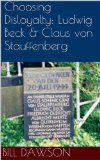Below is a collection of quotations concerning the German attack on Poland in September 1939. Not all quotes are from 01 September, but they reference the events that began that day.
You and your men must have plenty to do now. I just can’t grasp that people’s lives are now under constant threat from other people. I’ll never understand it, and I find it terrible. Don’t go telling me it’s for the Fatherland’s sake.
Sophie Scholl to Fritz Hartnagel, 05 September 1939, in At the Heart of the White Rose: Letters and Diaries of Hans and Sophie Scholl (US, UK, CA, DE [eng], DE [deu]).
Finis Germaniae
Admiral Wilhelm Canaris, upon hearing that the final order for “Operation White”, the attack on Poland, had been given by Hitler. In An Honourable Defeat: A History of German Resistance to Hitler, 1933-1945, by Anton Gill. (US, UK, CA, DE [eng])
The inhabitants are an unbelievable rabble, very many Jews and very much mixed population. A people which surely is only comfortable under the knout. The thousands of prisoners-of-war will be good for our agriculture. In Germany they will surely be useful, industrious, willing and frugal.
Claus von Stauffenberg, reporting from his service in Poland. Here we see a Stauffenberg clearly not yet committed to resistance. From Stauffenberg: A Family History, 1905-1944, p. 115.
Later:
I do not have the impression that our friends the Bolsheviks are using kid-gloves. This war is truly a scourge of God for the entire Polish upper class. They ran from us eastward. We are not letting anyone except ethnic Germans cross the Vistula westward. The Russians will likely make short work of them, since, as is well known by now, the real danger is only in the nationalistic Polish upper class who naturally feel superior to the Russians. Many of them will go to Siberia. [ibid.]
On 1 September 1939 there were no scenes of enthusiasm, no cheering crowds in Berlin like those in Munich in which Hitler had heard the news of the declaration of war twenty-five years before. When he drove to address the Reichstag at the Kroll Opera House at 10 a.m., the streets were emptier than usual. Most of those who turned to watch the line of cars accompanying the Führer stared in silence.
Allan Bullock, Hitler: A Study in Tyranny, p. 547. (US, UK, CA, DE [eng], DE [deu])
I am asking of no German man more than I myself was ready to do throughout four years. There will be no hardships for Germans to which I myself will not submit. My whole life belongs henceforth more than ever to my people. I am from now on just the first soldier of the German Reich. I have once more put on that coat that was the most sacred and dear to me. I will not take it off again until victory is secured, or I will not survive the outcome.
Adolf Hitler quoted in Bullock, p. 547.
Question: You believe then that Hitler did not realize in September 1939 that he had started a World War?
Albert Speer: From what I observed, I had to assume that this was not his intention. He intended to carry his plans one step further, as with Czechoslovakia.
…
On the other hand, there is this consideration. From the standpoint of the balance of military power, 1939 must have been the best year to start a war, better than two or three years later.
Albert Speer responding to questions under interrogation. From Richard Overy, Interrogations: The Nazi Elite in Allied Hands, 1945, p. 331.



